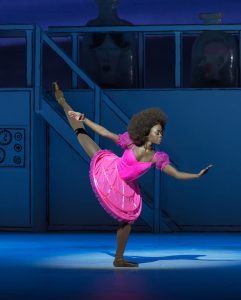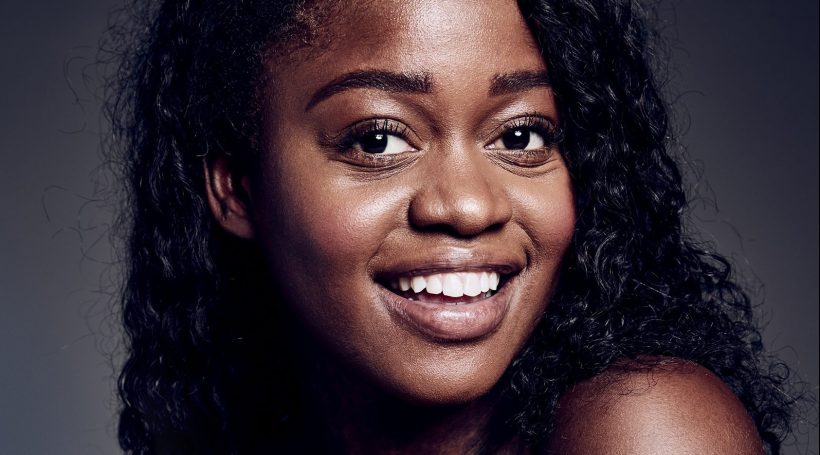 In 1999, Michaela DePrince was living through hell in Sierra Leone. After her father was murdered by rebels, the 4-year-old – then named Mabinty – moved with her mother to her uncle’s house. When her mother died of starvation, the uncle left Mabinty at a local orphanage. Because she had vitiligo, a condition that causes the skin to lose its color in blotches, the young girl was considered deeply unlucky. But one day, young Michaela found something blowing in the wind that would change her life: a ragged photo, torn from a magazine, of a graceful, poised ballet dancer.
In 1999, Michaela DePrince was living through hell in Sierra Leone. After her father was murdered by rebels, the 4-year-old – then named Mabinty – moved with her mother to her uncle’s house. When her mother died of starvation, the uncle left Mabinty at a local orphanage. Because she had vitiligo, a condition that causes the skin to lose its color in blotches, the young girl was considered deeply unlucky. But one day, young Michaela found something blowing in the wind that would change her life: a ragged photo, torn from a magazine, of a graceful, poised ballet dancer.
Thousands of miles away, Elaine and Charles DePrince were living through hell in Cherry Hill. They’d just lost two young sons, both to HIV, which they’d contracted through treatment for hemophilia. A third son, in the same situation, was gravely ill. All three boys had been adopted, and one, Michael, had long tried to convince his parents to adopt a child from a war-torn nation. After Michael died, Elaine found herself in Ghana, waiting to meet the child traveling from Sierra Leone.
A mix-up (there were two 4-year-olds named Mabinty at the same orphanage) brought Elaine and her daughters together. She brought both girls back home to Cherry Hill, and named them Mia and Michaela to honor the brother they never knew. Over the next several years, the DePrinces lost a third son and gained three more daughters, all from West Africa. Mia grew up to be a singer and a prolific songwriter. Michaela became a ballerina.
Today, Michaela is a principal dancer with the Dutch National Ballet and an ambassador of the international aid organization War Child. She’s the star of Jockey’s latest ad campaign and danced in Beyoncé’s visual album, Lemonade. She was also featured in the ballet documentary “First Position.” Michaela and Elaine, an accomplished author, teamed up to publish Michaela’s memoir, “Taking Flight.” Last year, MGM announced plans to turn the book into a feature film directed by Madonna.
Though Michaela is based in Amsterdam, and Elaine now lives in Georgia, the two are extremely close. Together, they shared their story of hope, hard work and family ties.
Q: Michaela, what do you remember about your early years in Sierra Leone?
Michaela: The war in Sierra Leone destroyed my family life and left me an orphan. The memories I recorded in my book had faded by the time I wrote my memoir. I relied on the notes my mother had taken of what I had told her when I first came to the United States. I was a talkative little girl and learned English quickly. My memories spilled out in those early times, but by the time I was 7 or 8, I had forgotten almost everything about my life in Africa, other than a few intense or heartwarming memories, but they faded with time. So, to be honest, now at the age of 23, I do not remember very much about my childhood in Africa. I rely on what I remembered at the age of 4 or 5.
Elaine: I knew some day it would be important to the girls that these memories were saved. When they were little I’d put on a hat and tell them I was Kermit the Roving Reporter, and I was going to interview them. They would sit down and tell me all about their lives. Michaela’s story was preserved because she told it to Kermit, and Kermit wrote it in a notebook. When she was asked to write this memoir, she said, “But I don’t remember anything,” and I said, “Well, I happen to have Kermit’s records.”
Q: What was it like to work together on the memoir?
Michaela: For me, it was fun writing the book with my mother. I think I developed a new respect for her. I discovered she is quite a brilliant writer. She took my ramblings, organized them and turned them into a beautiful book. When my mother sent me the advanced reader’s copy to review, I cried while I read it, because the writing was so beautiful.
Q: Elaine, you’ve raised 11 children, 9 of them adopted and 6 of them from war zones. Do you think your story will inspire other families to adopt?
Elaine: Either I’m inspiring other families or I’m chasing them away! Just kidding; really, it was part of what I needed to do to survive my children’s deaths. I can’t begin to describe how traumatized I was. It was part of what I needed to do to survive, and it truly brought me back to life.
Q: How long after arriving in the U.S. did Michaela start ballet lessons?
Elaine: When we first met, in the hotel room in Ghana, she was looking through my suitcase and standing on her toes pointing at my feet. She thought all American women wore pink pointe shoes, and she couldn’t understand why I was wearing red sneakers. When we first got home, she wasn’t interested in learning English – she was content to let her sister Mia do all the talking. I told her she had to learn English before she could enroll in ballet. Within a couple weeks, she was speaking English and going to dance classes.
Michaela: The first person to believe in me and my dream was my mother. I have accomplished this with hard work, perseverance and passion, but I could not have done it without the support, both emotional and financial, that my parents gave to me, not to mention their driving me everywhere. Even today, the person I know I can count on to give me good, straightforward advice and pick me up when I feel down is my mother.
Q: Do you remember a moment when you knew Michaela would make it big?
Elaine: Her very first year. She wasn’t happy with her ballet lessons. She said they were too easy. I bought her a Nutcracker video and she learned all the choreography perfectly. Later, I took the girls to Philly to see the show live and Michaela, all of 5 years old, leaned over and said, “You see the dancer on the left? She used the wrong foot.” I realized, oh my, this child is going somewhere with this. Her success hasn’t surprised me at all.
Q: Michaela, at just 23 you’ve already achieved your lifelong dream. What else do you hope to accomplish?
Michaela: In accomplishing my dream, I learned there was room in my life for more than just the physical aspect of dancing. I learned that it was possible to use my celebrity to reach out to others, which is why I take my duties as Ambassador for War Child Holland very seriously, and I feel honored when I am asked to teach or speak to groups of children who are faced with adversity. I am a ballerina who has a story to tell, a story of adversity that I know is important to the young people who are trying to achieve their goals and make their dreams come true. I remember that my mother once told me that a ballerina not only dances but she touches the hearts of others, and I try to do that.














